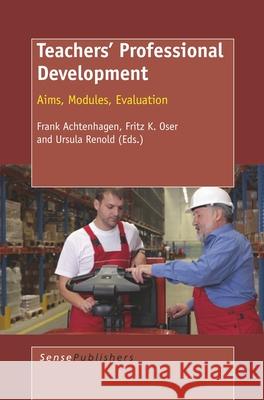Teachers' Professional Development : Aims, Modules, Evaluation » książka
Teachers' Professional Development : Aims, Modules, Evaluation
ISBN-13: 9789087907396 / Angielski / Miękka / 2009 / 188 str.
Within the central topics of the debate on teachers' professionalism are the problems of research-based and evidence-based initial and lifelong teacher behavior. Although the statements on professional similarities of teacher actions with those of other (academic) professionals are very plausible, there remains a central task for teacher educa-tion programs: How to develop towards such expertise - which is equal to evidence convictions - effectively and efficiently. Which role do scientific research and its results play in this con-text? How can research results be converted into recommendations for teacher actions? The contributions to this book focus on central problems of the conversion process: In the first part the goal dimension is treated: Maiello & Oser emphasize the relationship of central variables of teacher behaviour as identity, professional satisfaction or self-efficacy to teachers' professional behaviour; Blomeke, Felbrich & Muller discuss the role of future teachers' beliefs on the nature of mathematics; Stevenson uses cultural historical activity theory to work out cognitive schemas that can be targeted in vocational teacher education; Gruber tackles the problem of how vocational teachers can be supported to become experts by discussing especially four major possible research strategies. The second part of this book is dedicated to possible intervention approaches by which the gap of theory and practice shall be bridged. Steiner & Steiner report on critical learning incidents which heavily influence the micro-pro-cesses which characterize teachers' instructional measures; Winther differentiates the trait and state perspective of motivation with regard to their conse-quences for the learning process; Boekaerts focuses on aspects of collaborative learning; Weber sharpens her deliberations explicitly to a design experiment on the problem of initiat-ing intercultural learning. The third part of this book is a report of the use and the consequences of Oser's model of teaching standards. Baer, Dorr, Fraefel, Kocher, Kiester, Larcher, Muller, Sempert & Wyss show results of a large study on the development of teacher competences run in Switzerland and Germany. The study observes the competence development of prospective teachers from the beginning of their teaching training up to the job entry phase. This book is published under the auspices of the Swiss Federal Office for Professional Education and Technology."
Within the central topics of the debate on teachers professionalism are the problems of research-based and evidence-based initial and lifelong teacher behavior. Although the statements on professional similarities of teacher actions with those of other (academic) professionals are very plausible, there remains a central task for teacher educa¬tion programs: How to develop towards such expertise - which is equal to evidence convictions - effectively and efficiently. Which role do scientific research and its results play in this con¬text? How can research results be converted into recommendations for teacher actions? The contributions to this book focus on central problems of the conversion process: In the first part the goal dimension is treated: Maiello & Oser emphasize the relationship of central variables of teacher behaviour as identity, professional satisfaction or self-efficacy to teachers professional behaviour; Blömeke, Felbrich & Müller discuss the role of future teachers beliefs on the nature of mathematics; Stevenson uses cultural historical activity theory to work out cognitive schemas that can be targeted in vocational teacher education; Gruber tackles the problem of how vocational teachers can be supported to become experts by discussing especially four major possible research strategies. The second part of this book is dedicated to possible intervention approaches by which the gap of theory and practice shall be bridged. Steiner & Steiner report on critical learning incidents which heavily influence the micro-pro¬cesses which characterize teachers instructional measures; Winther differentiates the trait and state perspective of motivation with regard to their conse¬quences for the learning process; Boekaerts focuses on aspects of collaborative learning; Weber sharpens her deliberations explicitly to a design experiment on the problem of initiat¬ing intercultural learning. The third part of this book is a report of the use and the consequences of Osers model of teaching standards. Baer, Dörr, Fraefel, Kocher, Kiester, Larcher, Müller, Sempert & Wyss show results of a large study on the development of teacher competences run in Switzerland and Germany. The study observes the competence development of prospective teachers from the beginning of their teaching training up to the job entry phase. This book is published under the auspices of the Swiss Federal Office for Professional Education and Technology.











